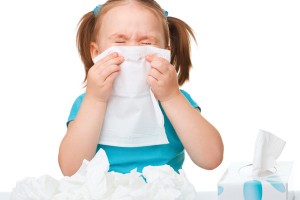Ah, ah, ah-choo! It’s that time of year, when tissues fly off the shelves, and parents prowl the aisles for over-the-counter medications (OTC). But wait — is it OK to give OTC meds along with a doctor’s prescription? Do hand sanitizers really work? And what about other home remedies for sore throats and coughs?
Acetaminophen Advice
In the summer of 2011, some makers of liquid acetaminophen revised their infant and children products to contain a standard amount of medicine. Prior to that, infant’s medicine was three times as strong as the children’s version. Why the change? “Overdoses were happening,” says Rosy Thind, M.D. with Group Health Associates in Finneytown. She explains that parents were giving toddlers and kids the same medicine they were giving to their infants, and not realizing that the infant drops were more concentrated so that infants didn’t have to consume as much liquid. The concentration of the infant drops is now diluted to match the children’s concentration (160mg/5mL), so be sure to check the dosing amounts before administering any medication.
Of course, it’s always best to consult your pediatrician before giving your child any kind of OTC pain or fever reliever. Thind advises parents to steer clear of ibuprofen for babies under 6 months, as there haven’t been any real studies to test the effects. She also says parents should not give acetaminophen to infants under 2 months of age. “If they display symptoms like a fever or are irritable, then they need to be seen, as they could have a serious infection.” Parents should always call their pediatrician if their infant under 2 months of age has a fever of 100.4 degrees or higher, and call if your child’s fever reaches 103 degrees. Thind also advises that parents take into consideration how their child appears. “Do they perk up after some medication? What other symptoms are present?” she says.
Help at Home
Thind says it is OK to give an OTC medication like ibuprofen or acetaminophen along with a doctor’s prescription – just make sure your pediatrician knows about it. “It’s OK with antibiotics, there’s no drug interaction,” she says, adding that antibiotics won’t be prescribed for a cold caused by a virus. Which unfortunately means that your little guy or gal is going to have to suffer through it. But there are some home remedies that might help ease his or her symptoms, along with acetaminophen or ibuprofen for fevers or pain. Thind says a teaspoon of honey for kids over 1 year is good for congestion and coughs, and tea or warm soup is a good way to thin mucous. “Parents can also sit in a steamy bathroom with their child and read a book.”
You can also break out the vaporizer or humidifier. “Either one is helpful for colds caused by a virus,” says Thind, “as they both put moisture in the air.” Vaporizers typically put out warm steam, while humidifiers provide a cool mist. Make sure you keep them clean, though! “Mold can build up if they’re not cleaned and drained,” says Thind, adding that parents should always read the manufacturer’s instructions for proper cleaning guidelines.
A Word on Prevention
The most important thing you can do this cold season? “Cover your mouth when you cough or sneeze and wash your hands!” says Thind. She suggests a good trick to teach your kids: sing the Alphabet Song while scrubbing their hands (ALL of their hands, including palms, fingers, backs of hands and wrists). When they reach the last letter, they’re done. “And regular soap is fine, it doesn’t have to be anti-bacterial,” she says, adding that hand sanitizers are OK to use a couple times throughout the day, but always wash your hands at a sink whenever you can.





